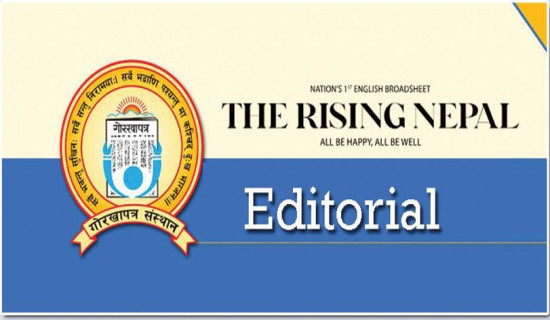- Wednesday, 5 February 2025
Attracting Investors
Despite having abundant natural resources, Nepal has been unable to tap them in the absence of capital, technology and competent human resources. Nepal began to interact with the outside world more than seven decades ago. Accordingly, it has received foreign aid, grants, loans and investment to fuel economic growth but the outcomes are not up to the mark. It is still in the dire need of foreign direct investment (FDI) as the world has increasingly become interdependent and connected digitally and economically. FDI and foreign trade are crucial to transfer technology, knowledge and managerial skills in the receiving countries. It boosts economic expansion and generates employment opportunities. It is generally individuals, companies and corporations that are striving to expand their business and enterprises to new or potential foreign markets for the growth of their assets.
Nepal has embraced liberal economic and political order conducive for the inflow of FDI in the country. It has formulated several laws to facilitate the FDI while trying to overcome the consequences arising from the instability, bureaucratic hassles, and lack of skilled workers and adequate infrastructures. Despite the unstable scenario, virtually all political parties are on the same page when it comes to drawing FDI for inclusive economic growth. The country is now gearing up to host the 3rd Investment Summit slated for April 28-29 in Kathmandu with a view to present potential sectors for foreign investment. The Office of Investment Board Nepal (OIBN) has come up with a list of 151 projects for showcasing to foreign investors. Of them, 31 projects are from private sector and 120 from the government side. They are related to hydropower, transport, tourism, multipurpose parking, expressway, tunnel way and agriculture.
Given that Nepal is rich in water resource, 19 projects of the private sector are related to hydropower development. Similarly, projects on solar, fast charging stations and transmission lines are also in priority. As the world is shifting to green energy from fossil fuel, these projects have greater chance of attracting FDI. Similarly, the OIBN has picked Happy Land Fun Park and Resort at Surunga in Jhapa, Natural Agriculture Farm at Taulihawa, Sikles-Annapurna Cable Car, Jalpadevi Cable Car, IME Cement at Baitadi, Kathmandu Technical School, Compost Fertilizer and Revolving Parking Project. In order to boost tourism, it has proposed to build 10 luxury hotels on the trails of Mount Everest and a Bharatpur Island Resort and Waterland and Limestone Excavation and Transport. The foreign investors will be encouraged to invest in promoting the value chain of ginger, large cardamom, highland potato and Timur (Sichuan Pepper).
The investment summit is indeed an opportunity for Nepal to convince investors in making investments in the areas of green energy, tourism, agribusiness, manufacturing, urban development and information technology. Of late, the country has pushed legal and policy reforms, and infrastructure development while building a network with foreign investors, public agencies, local businesses, and development partners so as to promote the nation as sustainable and attractive investment destination. A growing number of foreign organisations and companies have decided to participate in the summit that will familiarise them with government's policy and programmes aimed at bringing in FDI. All concerned stakeholders, including the government agencies, political parties, private sector, civil society and media should work together to make this event a success.

















